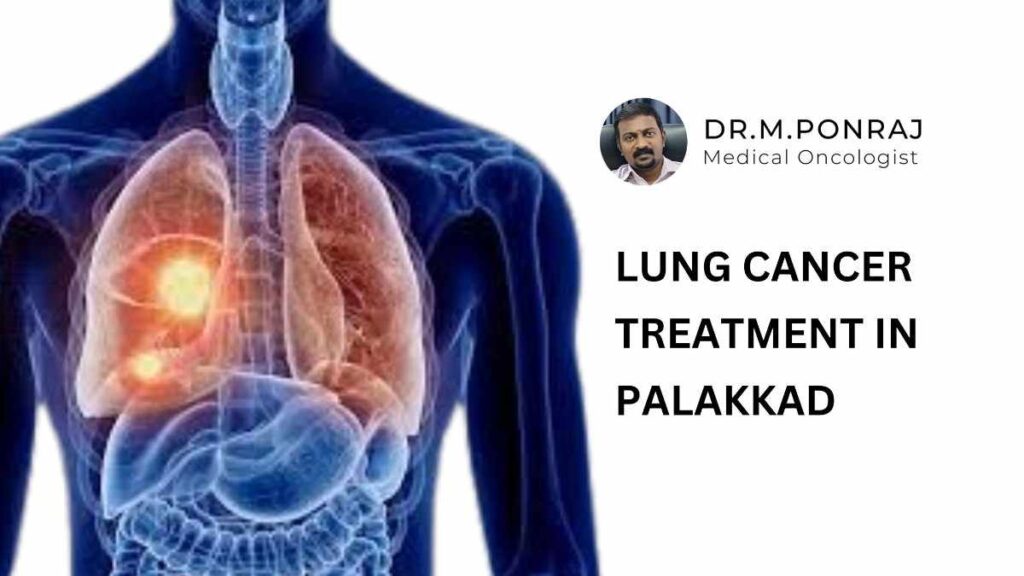Lung cancer remains one of the most challenging and concerning diseases in today’s world. With increasing awareness and advancements in treatment technologies, patients now have access to comprehensive care that not only focuses on treating the disease but also on improving the overall quality of life. In this blog, we will delve into every essential aspect of lung cancer care—from understanding the disease to exploring modern treatment techniques, risk factors, symptoms, and the importance of early diagnosis. As a leading medical oncologist, I, Dr. Ponraj, bring years of experience, compassion, and dedication to revolutionize cancer care.
About Lung Cancer
Lung cancer is a complex disease, characterized by the uncontrolled growth of abnormal cells in the lung tissue. It is primarily categorized into two main types: non-small cell lung cancer (NSCLC), which accounts for approximately 85% of cases, and small cell lung cancer (SCLC), known for its aggressive nature and rapid spread. Despite continuous advances in early detection techniques, lung cancer remains a leading cause of cancer-related mortality worldwide. The current research and treatment protocols have evolved significantly, emphasizing early diagnosis and innovative treatment methods.
The Biology of Lung Cancer
Lung cancer develops when genetic mutations in lung cells lead to abnormal cell behavior and uncontrolled cell division. These changes often occur due to a mix of environmental factors, genetic predispositions, and lifestyle influences. Identifying the specific genetic markers of lung cancer has allowed for the introduction of precision therapies, which target these molecular changes directly and thereby offer more effective treatment outcomes.
Modern Advances in Treatment
Over the last decade, oncology has seen revolutionary advances in treatment options. These include targeted therapies, immunotherapy, and a combination of chemotherapy and radiation. Newer approaches have not only improved survival rates but also enhanced the quality of life for many lung cancer patients. Today’s treatment strategies are more personalized than ever and are tailored to each patient’s unique genetic makeup, disease stage, and overall health status.
For patients who are located in the region of Palakkad, my practice offers a robust program known as lung cancer treatment in palakkad. This integrated program harnesses the latest advancements in medical technology and clinical research to deliver state-of-the-art care in a compassionate and nurturing environment.
Causes of Lung Cancer
Understanding the causes of lung cancer is essential for both prevention and early diagnosis. Research has identified several risk factors that contribute to the development of lung cancer, and knowing these can empower patients to make informed health decisions.
Environmental Factors
-
Smoking: Tobacco use is the number one cause of lung cancer. The chemicals in tobacco smoke are highly carcinogenic, leading to mutations that can initiate lung cancer development. Even for individuals who have quit smoking, the damage may still linger, making ongoing screening essential.
-
Secondhand Smoke: Exposure to secondhand smoke also increases the risk of developing lung cancer, particularly in environments where smoking is prevalent.
-
Radon Gas Exposure: Radon is a naturally occurring radioactive gas that can accumulate indoors. Long-term exposure to high radon levels has been linked to lung cancer.
-
Occupational Hazards: Occupational exposure to carcinogens such as asbestos, arsenic, silica, and diesel exhaust can significantly raise lung cancer risk.
Genetic and Biological Factors
-
Gene Mutations: Some genetic mutations predispose certain individuals to lung cancer. Research into specific genetic markers continues to improve our understanding of the disease and informs personalized treatment strategies.
-
Family History: A family history of lung cancer can increase the likelihood of developing the disease, as certain genes may be inherited that contribute to cancer risk.
Lifestyle Influences
-
Poor Diet and Inactivity: Although not direct causes, poor nutrition and lack of physical activity can weaken the body’s natural defenses, potentially contributing indirectly to the development and progression of lung cancer.
Recognizing the combination of environmental, genetic, and lifestyle factors helps clinicians in designing proactive approaches in early detection and prevention. For those seeking advanced care, my practice’s specialized program for lung cancer treatment in palakkad implements preventative measures and personalized screening strategies to identify risk factors early and intervene promptly.
Risk Factors
In addition to the causes, understanding risk factors is critical when assessing lung cancer susceptibility. The following factors have been identified as increasing the risk of lung cancer:
Smoking and Tobacco Use
-
Cigarette Smoking: As noted earlier, cigarette smoking remains the single largest risk factor for developing lung cancer.
-
Cigar and Pipe Use: These are also significant risk factors, particularly when used regularly over prolonged periods.
-
E-Cigarettes and Vaping: Emerging research suggests that even alternative forms of nicotine consumption might contribute to lung tissue damage.
Environmental Exposure
-
Air Pollution: Areas with high pollution levels have been linked to an increased incidence of lung cancer.
-
Exposure to Carcinogens: People working in heavy industries, construction, or jobs that involve exposure to chemicals and dust have higher lung cancer risks.
Genetic Predisposition
-
Inherited Mutations: As mentioned previously, a family history of lung cancer can denote a higher genetic predisposition to the disease.
-
Ethnic and Racial Factors: Certain ethnic groups may have variations in genetic susceptibility which could influence overall risk.
Other Medical Conditions
-
Chronic Lung Diseases: Conditions such as chronic obstructive pulmonary disease (COPD) and pulmonary fibrosis can increase the risk of lung cancer.
-
Immune System Disorders: A weakened immune system, whether due to illness or certain medications, may fail to protect the body from abnormal cell growth.
By understanding these risk factors, patients can take proactive steps towards mitigation. This approach extends to those exploring advanced options like lung cancer treatment in palakkad, where extensive screening protocols and preventive advice are provided to reduce risk and enhance early detection.
Meet Dr. Ponraj: Your Partner in Cancer Care
As a dedicated and compassionate Medical Oncologist based in Kerala, I have spent years honing my craft, learning from the latest research, and most importantly, working tirelessly to improve patient outcomes. My journey in oncology has been driven by passion, a commitment to advancing cancer care, and a deep empathy for my patients’ challenges.
Commitment to Innovation
In the constantly evolving field of oncology, staying abreast of the latest advancements is crucial. I continuously engage with both national and international research communities, attend conferences, and adopt innovative treatment protocols that reflect the cutting edge of cancer care. This commitment to innovation ensures that my patients benefit from the latest breakthroughs in medical science.
A Compassionate Approach
Beyond technical expertise, what defines my practice is empathy and a genuine concern for my patients’ overall well-being. I take time to understand the physical, emotional, and psychological challenges faced by patients and their families. Throughout the treatment journey—from diagnosis to post-treatment care—you will experience compassionate guidance, continuous monitoring, and a care plan that adapts to your evolving needs.
For those seeking specialized care, my clinic proudly offers a dedicated program for lung cancer treatment in palakkad, ensuring that cutting-edge treatment modalities are available in a local, accessible setting.
Why Choose Dr. Ponraj?
Choosing a healthcare provider, especially for something as serious as lung cancer, requires careful consideration. My practice stands out for several compelling reasons that make me a trusted partner in your journey toward recovery.
Expertise and Experience
With years of experience in managing various types of cancer, my expertise is built on a solid foundation of continuous learning, research, and clinical practice. I have managed cases ranging from early-stage to advanced lung cancer, always with a focus on personalized treatment planning. My comprehensive approach ensures that every aspect of your care is tailored to maximize effectiveness and comfort.
Personalized Treatment Plans
Every patient’s journey is unique. I understand that behind every diagnosis, there is a personal story filled with challenges and hopes. This drives me to design customized treatment plans that not only focus on eliminating cancer cells but also on enhancing quality of life. From the initial diagnosis to the post-treatment phase, your care plan will be meticulously tailored, and changes will be made as needed throughout your recovery process.
Use of Cutting-Edge Technologies
Staying current with technological advances is fundamental in modern oncology. My clinic is equipped with state-of-the-art diagnostic and therapeutic tools that allow for precise and effective treatment. These tools contribute to better prognosis and faster recovery times while ensuring you receive the most appropriate care based on your specific condition.
Holistic Patient Care
The journey through cancer treatment is not just about battling the disease—it’s about supporting the whole person. I focus on supportive care that encompasses both physical and psychological wellness. In addition to delivering direct oncological treatments, I also collaborate with nutritionists, therapists, and other healthcare professionals to create an integrated care model.
Proximity and Accessibility
For patients from the Palakkad area, my clinic offers a comprehensive and accessible service for lung cancer treatment in palakkad. This local focus means reduced travel times and easier access to follow-up care, which is crucial for maintaining momentum during the treatment process.
Understanding the Symptoms of Lung Cancer
Early detection of lung cancer significantly enhances treatment outcomes. Recognizing the symptoms can make the difference between early intervention and a delayed diagnosis. Although symptoms may vary based on the type and stage of lung cancer, there are common signs that you should be aware of.
Common Symptoms
-
Chronic Cough: A persistent cough that does not go away with time and may worsen over weeks.
-
Chest Pain: Discomfort or pain in the chest which might intensify during coughing or deep breathing.
-
Breathing Difficulties: Shortness of breath or wheezing, often noticeable during routine activities.
-
Unexpected Weight Loss: Losing weight without trying can be an alarming symptom linked to various types of cancer, including lung cancer.
-
Fatigue: Feeling unusually tired or weak, which may be compounded by decreased lung capacity.
-
Coughing Up Blood: Also known as hemoptysis, this is a serious symptom that should prompt immediate medical attention.
-
Recurrent Respiratory Infections: Frequent bouts of bronchitis or pneumonia may indicate underlying lung pathology.
A Closer Look at Symptoms
Some patients experience symptoms so subtle that they may dismiss them until the disease has progressed significantly. Therefore, it’s important to remain vigilant, especially if you fall into one of the high-risk groups described earlier. My approach always emphasizes early screening, particularly for those who might be candidates for the specialized lung cancer treatment in palakkad program.
Questions to Ask Your Oncologist
When you or a loved one is diagnosed with lung cancer, you may have many questions regarding treatment options, recovery expectations, and long-term prognosis. It is essential to feel empowered by asking the right questions before committing to a treatment plan. Here are some important questions to discuss during your consultation:
-
What is the specific type and stage of my lung cancer?
Understanding the diagnosis is the first step in planning an effective treatment strategy. -
What treatment options are available for my condition?
Explore the possibilities of surgery, chemotherapy, radiation therapy, immunotherapy, or targeted drugs, and learn how a combination of these may work best. -
What are the potential side effects of each treatment?
It is crucial to understand both the benefits and the potential adverse effects so that you can make an informed decision. -
How will treatment impact my quality of life?
Discuss strategies for managing side effects, preserving physical strength, and maintaining emotional well-being during treatment. -
What is the expected recovery time for the chosen treatment?
A clear timeline helps set realistic expectations for returning to your normal routine. -
Will I have access to supportive and palliative care if needed?
Comprehensive care includes support throughout your treatment journey, and it is important to know about available resources. -
How frequently will I need to follow up with my care team?
Regular monitoring is key for adjusting treatment plans as your condition evolves. -
What advancements does your clinic offer in lung cancer care?
For those seeking specialized programs such as lung cancer treatment in palakkad, understanding the innovative techniques available is essential.
Discussing these questions can help you build confidence in your treatment plan and ensure that you are fully informed of your options. My practice always encourages an open dialogue, and I am here to answer any questions you may have.
Recovery Time: What to Expect
Recovery from lung cancer treatment varies significantly from patient to patient. Several factors influence recovery time, including the stage of cancer at diagnosis, the type of treatment administered, and the overall health and resilience of the patient. It is important to discuss your individual circumstances with your treatment team to set realistic expectations.
Factors That Affect Recovery
-
Stage of Cancer: Early detection typically means a shorter recovery time compared to advanced stages where multiple treatment modalities might be necessary.
-
Type of Treatment: Surgery may require several weeks of recuperation, while some patients receiving targeted or immunotherapy might experience different recovery trajectories.
-
Overall Health: Patients with robust overall health often recover faster and are more resilient to the side effects of treatment.
-
Support System: A strong network of family, friends, and healthcare professionals contributes to a smoother recovery process by providing both emotional support and practical assistance.
Personalized Recovery Plans
In my practice, every treatment plan is accompanied by a detailed recovery plan. This not only includes medical follow-ups and rehabilitation strategies but also lifestyle and nutritional advice to support physical and emotional healing. For those accessing our services in the region, our specialized lung cancer treatment in palakkad program pays special attention to recovery, ensuring that patients have continuous access to supportive care and resources during their recuperation process.
Long-Term Management
Managing lung cancer is not just about immediate recovery—it’s also about long-term survivorship care. Regular monitoring, physical therapy, and mental health support are integral parts of the comprehensive approach we take. This ongoing support system helps in minimizing the risk of recurrence and enhances overall life quality.
The Journey to Empowerment in Lung Cancer Care
When confronted with a lung cancer diagnosis, it’s natural to feel overwhelmed. However, the journey to recovery is made manageable with the right approach, support, and expertise. Here’s how I help empower my patients on their road to recovery:
A Step-by-Step Process
-
Initial Consultation:
Every patient receives an in-depth consultation where we discuss symptoms, medical history, and perform necessary diagnostic tests. This sets the stage for a personalized treatment plan. -
Detailed Diagnostic Work-Up:
Using advanced imaging and molecular testing, we accurately determine the type and stage of cancer. This informs the treatment strategy and helps identify any genetic mutations that might be targeted with precision therapy. -
Customized Treatment Planning:
With all diagnostic information in hand, I craft a treatment plan tailored specifically to the patient’s needs. This plan is dynamic, adapting based on how the patient responds to treatment. -
Implementation of Advanced Therapies:
Our treatment arsenal includes the latest in chemotherapy, immunotherapy, and radiation therapy. For local patients, our dedicated lung cancer treatment in palakkad program ensures that you have access to these advanced modalities without the need to travel far. -
Support Services:
Along with the primary treatment, I emphasize supportive care—including nutritional counseling, psychological support, and physical rehabilitation—to foster holistic healing. -
Regular Follow-Up and Adjustments:
Continuous monitoring allows us to fine-tune the treatment plan over time, addressing any side effects and ensuring that the plan remains effective throughout the recovery process.
The Importance of a Patient-Centered Approach
Every lung cancer treatment journey is unique, which is why I prioritize a patient-centered approach. This method not only focuses on combating the disease but also on maintaining an optimal quality of life. My commitment to personalized care is evident in every aspect of my practice, from the initial consultation to the follow-up support after treatment. I believe that every patient deserves tailored care, and I strive to be a compassionate partner who helps guide you through every step of your treatment.
Integrating Technology and Compassion in Cancer Treatment
Innovation in technology has revolutionized how lung cancer is treated. The integration of advanced diagnostic tools, genetic profiling, and modern therapeutic techniques has transformed the landscape of oncology care. Here’s how technology and compassion work in tandem within my practice:
The Role of Precision Medicine
-
Genetic Profiling:
By studying the specific genetic alterations in your tumor, we can recommend targeted therapies that directly attack the cancer cells. This precision reduces unnecessary side effects and maximizes treatment benefits. -
Immunotherapy:
Immune-based therapies boost your body’s natural defenses to fight cancer. This cutting-edge approach is often combined with other modalities to optimize outcomes. -
Data-Driven Decisions:
Advanced imaging and diagnostic software allow us to track the progress of the treatment in real time. This continuous feedback loop ensures that we can swiftly modify the treatment plan as needed.
Compassionate Support Throughout the Process
While technology provides the tools, compassion is the driving force behind excellent care. My team and I are dedicated to supporting not just the physical but also the emotional needs of every patient. In our clinic, we create a welcoming environment where questions are encouraged and each treatment phase is explained in detail. If you are considering options for lung cancer treatment in palakkad, you can be confident that you will receive not only advanced medical care but also the compassion and support needed to navigate this challenging journey.
The Value of Early Diagnosis
Early detection of lung cancer is a critical factor in achieving favorable outcomes. When lung cancer is diagnosed at an early stage, treatment can be more effective, and the chances of a full recovery increase substantially. There are several reasons why early diagnosis is important:
-
Improved Prognosis:
Detecting the disease in its nascent stages often allows for more treatment options and higher survival rates. -
Less Intensive Treatment:
Early-stage lung cancer might require less aggressive treatment compared to advanced cases, reducing side effects and recovery time. -
Better Quality of Life:
A timely diagnosis provides an opportunity for early intervention, which can mitigate the impact of the disease on everyday life.
For the residents and patients in the region, our program for lung cancer treatment in palakkad actively promotes early screening programs, ensuring that every at-risk individual is identified and given timely advice on preventive measures.
Navigating Your Treatment Journey: Practical Advice for Patients
Understanding and accepting a lung cancer diagnosis is only the first step. Navigating the complexities of treatment and recovery can be overwhelming. Here are several practical tips for managing this journey:
Stay Informed and Engaged
-
Ask Questions:
Never hesitate to ask for clarification on any aspect of your treatment plan. Knowledge is a powerful tool in making informed health decisions. -
Keep a Journal:
Documenting your symptoms, treatment side effects, and questions can help you track progress and prepare for your follow-up visits. -
Utilize Support Networks:
Engage with patient support groups, either locally or online, to share experiences and gain valuable insights from others who have faced similar challenges.
Maintain a Healthy Lifestyle
-
Nutrition:
A well-balanced diet supports overall health and aids in recovery. Work with a nutritionist to create a meal plan that meets your unique needs. -
Physical Activity:
When approved by your treatment team, light exercises such as walking or yoga can improve your mood and physical stamina. -
Mental Health:
Don’t underestimate the importance of mental well-being. Psychological support, counseling, or mindfulness practices can be invaluable during your recovery.
Leverage Local Resources
For those residing in or near Palakkad, choosing specialized options such as lung cancer treatment in palakkad ensures that you have access to the best local care. Local clinics and hospitals offer not only state-of-the-art treatment options but also a more personal connection with your care team.
Recovery Time: What Does the Future Hold?
While the path to recovery from lung cancer is unique for every patient, understanding general expectations can help you stay prepared. Recovery is a journey that requires time, patience, and consistent follow-up care.
Immediate Post-Treatment Phase
Immediately following treatment, patients may experience side effects that require careful management. These side effects can vary from fatigue and nausea to more specific symptoms related to the type of treatment administered. During this time, regular monitoring ensures that any adverse reactions are promptly addressed.
Long-Term Recovery and Follow-Up
Long-term recovery involves:
-
Regular Check-Ups:
Scheduled follow-up visits help in detecting any recurrence early. -
Rehabilitation Programs:
Integrated rehabilitation, including physical therapy and nutritional counseling, assists in regaining strength and improving overall quality of life. -
Emotional Support:
Ongoing counseling and support networks play a critical role in navigating the psychological aspects of recovery.
For those embarking on our specialized care program for lung cancer treatment in palakkad, our long-term follow-up routines are designed to support you every step of the way. This comprehensive approach ensures that even after the primary treatment phase, you remain supported and monitored for any changes.
BEST 5+ ONCOLOGISTS IN PALAKKAD
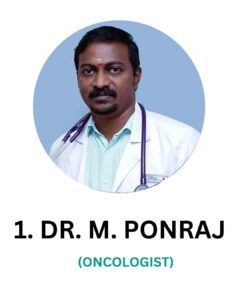
As a dedicated oncologist, I specialize in providing compassionate, cutting-edge cancer care, ensuring my patients receive the best possible treatment tailored to their unique needs.
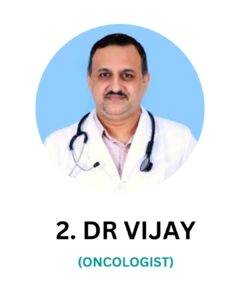
With a deep commitment to oncology, I focus on early diagnosis, advanced treatments, and patient-centered care to improve outcomes and enhance quality of life for those battling cancer.
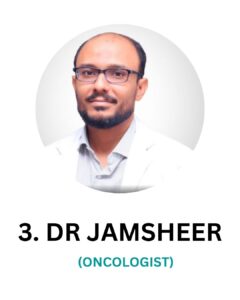
I am an experienced medical oncologist passionate about integrating the latest research and technologies to offer personalized cancer treatment plans for my patients.
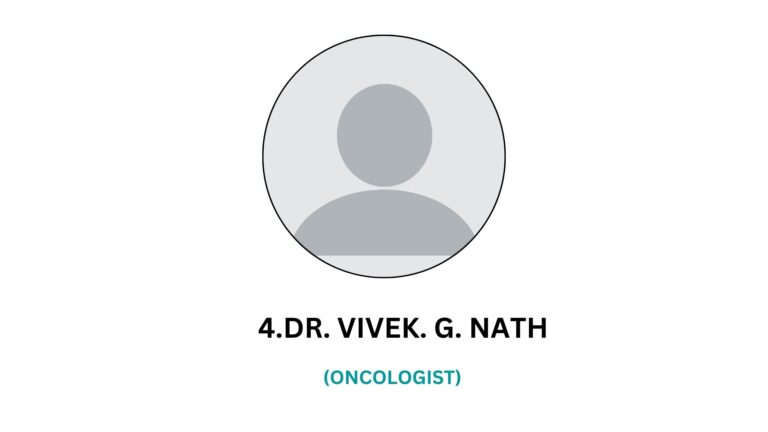
As an oncologist, my mission is to provide expert cancer care with empathy, helping patients and their families navigate their treatment journey with confidence and hope.
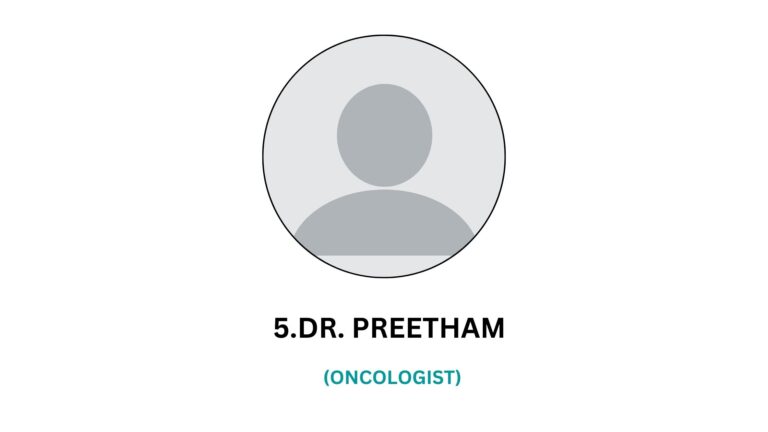
With years of experience in oncology, I specialize in chemotherapy, immunotherapy, and targeted treatments, ensuring every patient receives the most effective and compassionate care.

I am a cancer specialist dedicated to advancing oncology through innovation, precision medicine, and a holistic approach to treatment, prioritizing both survival and well-being.
FAQ
1. What are the common symptoms of lung cancer?
Common symptoms include persistent cough, chest pain, shortness of breath, coughing up blood, unexplained weight loss, and fatigue. Early detection is crucial for effective treatment.
2. What causes lung cancer?
The primary cause is smoking, but other factors include exposure to secondhand smoke, radon gas, asbestos, and other carcinogens. Genetic predisposition can also play a role.
3. What are the risk factors for developing lung cancer?
Risk factors include smoking, exposure to secondhand smoke, exposure to radon gas, occupational exposure to carcinogens, and a family history of lung cancer.
4. Who is Dr. Ponraj, and how can he help in lung cancer treatment?
Dr. Ponraj is a dedicated medical oncologist based in Kerala, specializing in personalized cancer care. He offers tailored treatment plans for lung cancer patients, focusing on precision, innovation, and empathy to enhance treatment effectiveness and quality of life.
5. Why choose Dr. Ponraj for lung cancer treatment in Palakkad?
Dr. Ponraj combines expertise with compassion, providing personalized treatment plans using cutting-edge technologies. His patient-centered approach ensures continuous monitoring and support throughout the treatment journey.
6. What questions should I ask my oncologist about lung cancer treatment?
What type and stage of lung cancer do I have?
What treatment options are available?
What are the potential side effects?
How will treatment affect my daily life?
What is the expected prognosis?
7. What is the recovery time after lung cancer treatment?
Recovery time varies depending on the treatment type and individual health. Surgery may require weeks to months, while chemotherapy and radiation therapy have different timelines. Continuous follow-up is essential for monitoring progress.
8. Are there advanced treatment options available in Palakkad?
Yes, Palakkad offers advanced treatment options, including chemotherapy, immunotherapy, targeted therapy, and supportive care. Facilities like Thangam Hospital provide comprehensive cancer care with state-of-the-art technologies.
9. Is lung cancer treatment in Palakkad covered by insurance?
Many hospitals in Palakkad accept insurance for lung cancer treatment. It’s advisable to consult with your insurance provider and the hospital’s billing department to understand coverage details.
10. How can I book an appointment for lung cancer treatment in Palakkad?
You can book an appointment with specialists like Dr. Ponraj through hospital websites or healthcare platforms. Ensure to have your medical records and test results ready for the consultation

